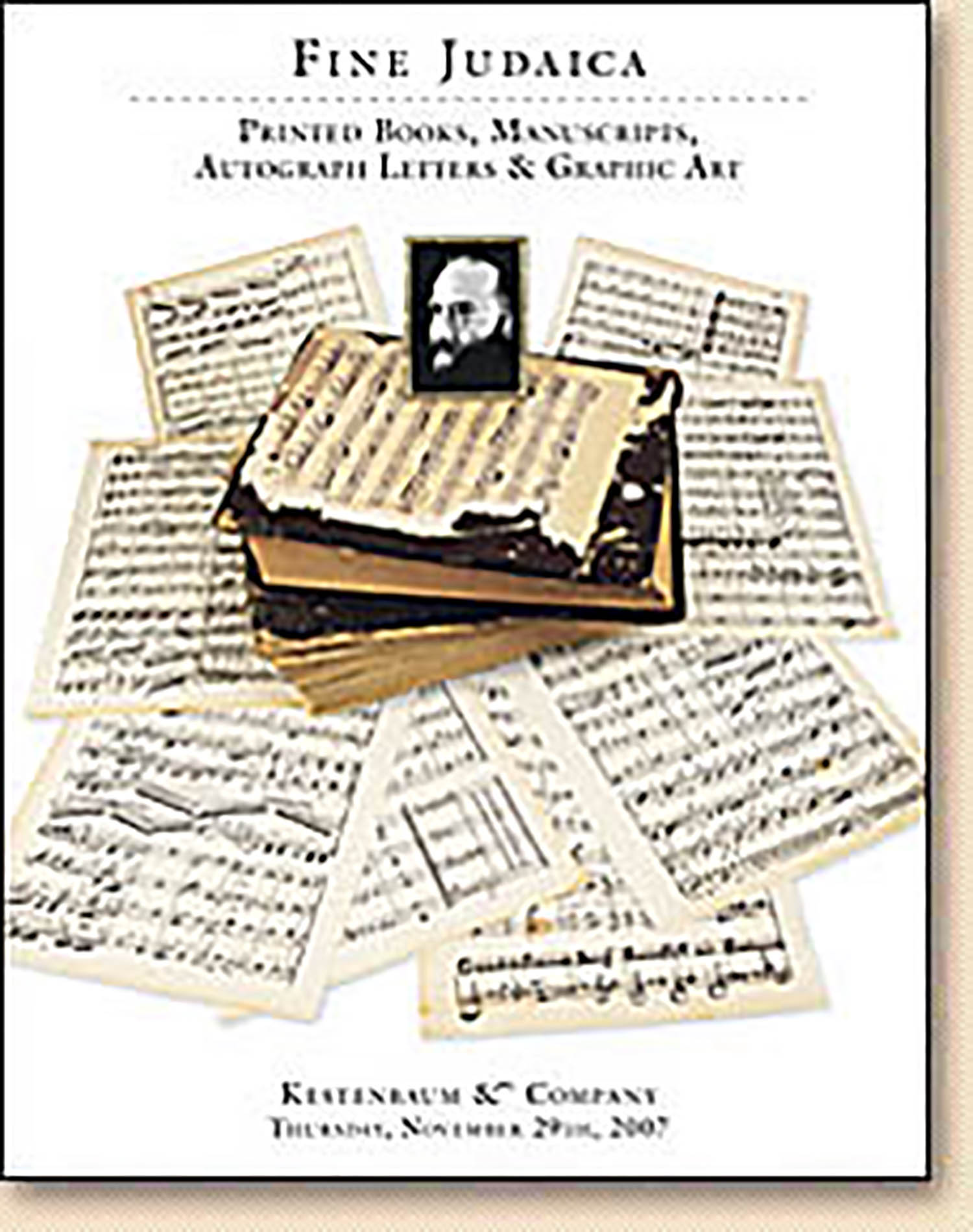Autograph Letter Signed to Rabbi Zalman Sorotzkin of Jerusalem

AUCTION 38 |
Thursday, November 29th,
2007 at 1:00
Fine Judaica: Printed Books, Manuscripts, Autograph Letters & Graphic Art
Lot 295
KOTLER, AARON
Autograph Letter Signed to Rabbi Zalman Sorotzkin of Jerusalem
New York: Friday, Parshath Pekudei [March 9th], 1951
Est: $2,000 - $3,000
PRICE REALIZED $2,200
Rabbi Aaron Kotler (1892-1962), was one of the finest Talmudists of his day. A brilliant graduate of the Slabodka Yeshiva, he was married to the daughter of R. Isser Zalman Meltzer, Rosh Yeshivah of Slutzk. Eventually, R. Kotler went on to found his own yeshivah in Kletzk, Poland, which after the war reorganized in Lakewood, New Jersey. Rabbi Kotler was instrumental in the Va'ad Hatzalah, an organization under Orthodox auspices which sought to save the lives of European Jewry during the Holocaust. "Reb Aharon," as he was referred to endearingly, was the Chairman of the Mo'etzeth Gedolei ha-Torah (Council of Torah Sages) of the American branch of the Agudath Israel movement. In the early years of the State of Israel, when the Charedim felt themselves besieged by a secular government, it was R. Aaron Kotler of America, together with his counterparts in Eretz Israel, R. Abraham Isaiah Karelitz ("Chazon Ish") of B'nei Berak and R. Isaac Ze'ev Soloveitchik ("Brisker Rov") of Jerusalem, who provided leadership. See EJ, Vol. X, cols. 1221-2.
R. Zalman Sorotzkin (1881-1966), son-in-law of R. Eliezer Gordon, founder of the Telz Yeshiva, served until the outbreak of World War II as Rabbi of Lutzk, Poland. The "Lutzker Rov," as he was known, was active before the War in the Vilna Va'ad ha-Yeshivoth (under the auspices of R. Chaim Ozer Grodzinski), and after the War in the Israeli Va'ad ha-Yeshivoth, which he presided until his death. He also chaired the Mo'etzeth Gedolei ha-Torah of the Agudath Israel movement, and led the movement's independent educational system, Chinuch Atzma'i. His son, R. Baruch Sorotzkin was one of the rashei yeshivah (deans) of the Telz Yeshivah in Cleveland. See EJ, Vol XV, cols.166-7.
The present letter touches upon several issues affecting the Charedi population of Eretz Israel at the time: The attempt to repeal the Ben-Gurion government's decision to draft Orthodox women into the army, the drive to enroll children of recently arrived immigrants into Orthodox educational institutions and the organization of food shipments from America to impoverished yeshivah students and their families.
Specifically, the letter is broken down into seven points:
1-2) Rabbi Kotler reports that he has met with the "Joint" (Joint Distribution Committee) regarding shipping food to the yeshivah students for the imminent holiday of Passover.
3) The Va'ad Hatzalah leadership will be comprised of the Chief Rabbi [Herzog] along with Rabbis Sarna, Karelitz and Finkel.
4) Agudath Israel has agreed to fund the establishment of new Talmud Torahs, the funds to be administered by the Chazon Ish. (Rabbi Kotler advises R. Sorotzkin to work closely with the Chazon Ish in this matter. Specifically, R. Kotler requests that funding be infused immediately into the Talmud Torah recently established by his student Dershowitz, who was one of several prize students Reb Aharon dispatched to Eretz Israel to aid the children of Yemenite and North African immigrants. This organization of yeshivah activists was known as "Pe'ilim." (See R. Yitzchok Deshowitz, The Legacy of Maran Rav Aharon Kotler, Feldheim, 2006).
5) A cryptic reference to the situation in Petach Tikvah and to [Benjamin] Mintz [of Po'alei Agudath Israel].
6) Regarding the "rediphoth" (persecutions) of the Government, such as G.N. [=Giyus Nashim, the decision to draft women into the Israeli Army], it is best to appeal to the Agudath ha-Rabbanim, the Union of Orthodox Rabbis of the United States and Canada.
7) Regarding TaShBaR (initials Tinokoth shel Beith Rabban, i.e. elementary education), R. Kotler promises to convene a meeting next week.
In a lengthy postscript, R. Kotler beseeches R. Sorotzkin and the other members of the Mo'etzeth Gedolei ha-Torah (Council of Torah Sages) to act in unison, as dissension and strife in their ranks weaken their chance of success in the upcoming elections.
The overall sensitive nature of this communiqué is borne out by the fact that another hand has written on the outside panel, "chasuy ve-sodi ve-ein le-har'otho le-ish" (secret and confidential, not to be shown to anyone)
